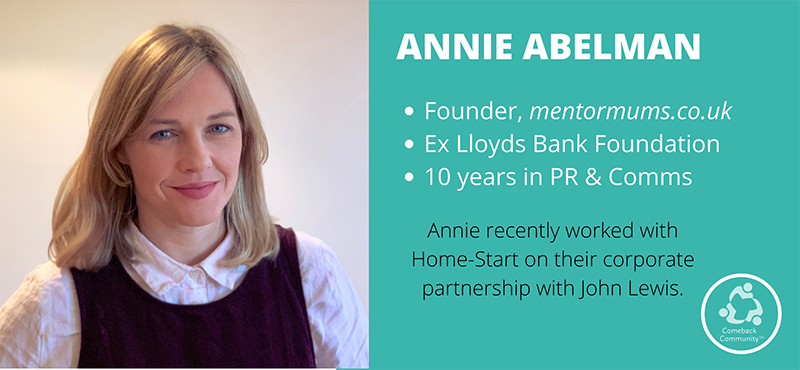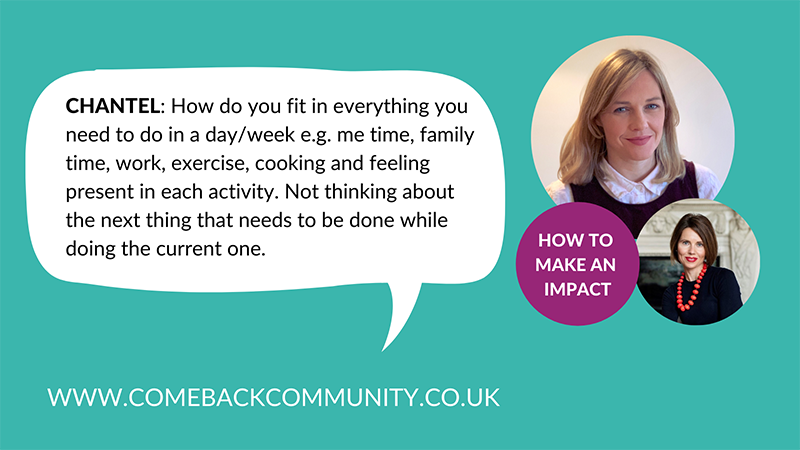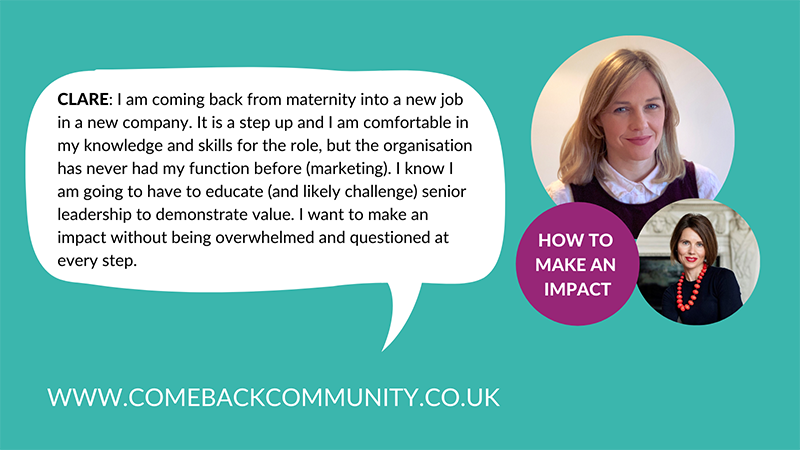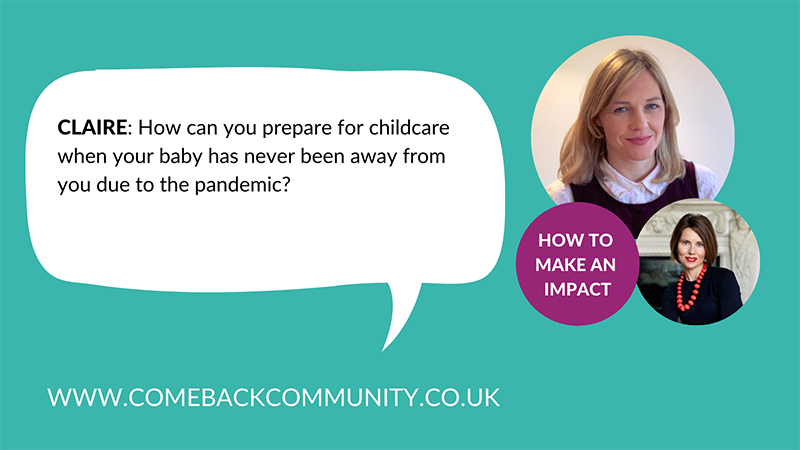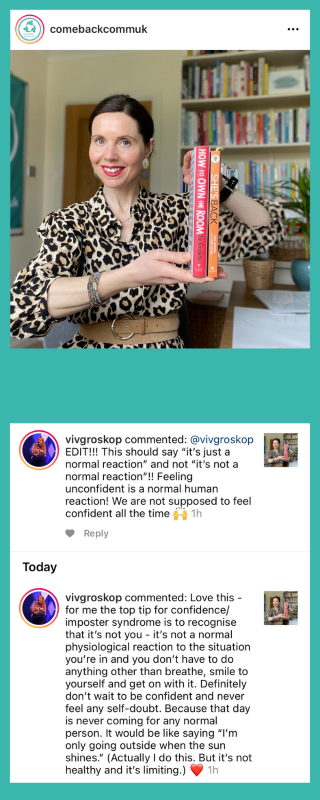Comeback Conversation
Comeback Conversation – How To Make An Impact When You Return To Work
When Annie returned from maternity leave to her job of Head of Communications for Lloyds Bank Foundation England & Wales she was tasked with two mammoth projects…which she delivered! Whilst battling the self-doubt and imposter syndrome most new parents feel after almost a year away from work, Annie was asked to launch a new organisational strategy while also leading a major brand refresh, with just seven months lead in time for to complete and unveil both. She had to double the size of her team, leading everything from the recruitment process, onboarding new staff and gearing everyone towards our two big deadlines.
Annie left in 2019 to complete a Masters, write her first novel and found Mentor Mums – a mentoring service that matches mums returning to work with another mum in their professional field who is a few steps ahead.
Annie was our Comeback Conversations guest in March 2021 answering your questions on how to make an impact when you return to work.
We got through loads of your questions about returning to work from maternity, adoption, shared parental leave, sickness and career breaks. Here are three of them and some top tips at the end.
- You can’t! You can’t do everything. The first thing I had to tell myself was that good enough was going to have to be good enough. I had to re-align my expectations of myself. I am a perfectionist and I like to get things done to the best of my ability.
- It’s important to acknowledge that some boundaries have to shift. You have to ring-fence certain portions of your life to be able to fit more in. Instead of trying to fit more in, prioritise ruthlessly. Write your to do list, colour code it, star it – whatever you need to do to see what is nice to have and what is essential. Think about what your standard was and where you are now going to take it, both at home and work.
- At work, I realised if I wanted to get more done and achieve my goals, I had to delegate more within my team. Don’t be afraid to give them something that you might see as a small task because for them that might seem like a big task and by giving it to them, you allow them the opportunity for growth and development. And you free up time to do something new. If you think of it as ‘I’ve given them something great’, then you feel less like you have dumped something on them that you find easy or boring.
- If you can’t delegate, the other thing is saying to your boss, yes, I can do this thing, but if I do, then another project is going on hold. Again, it’s about saying, I’m not going to do it all and I’m not going to spread myself thinner. If you do, you will burn out.
- It’s important that we all have that feeling that we have excelled at something – the rough with the smooth, the ups with the downs. At the end of the day, we need to think, I’ve delivered that, and it was really satisfying. We can only do that if we’re not giving energy to everything.
- This is actually your superpower. You may have moved house before, went to a university where you didn’t know anyone, gotten a new hairstyle. Whatever you did, you were able to redefine your identity at that point. You were able to go there and be someone that no one knew.
- When you return after leave, either to the same organisation or somewhere new, you get to do that again, but you already know what you are doing. Instead of being at university where everything’s new, you’re walking back into an environment, even if it’s a new company, it’s still your role. Your superpower is that you get to invent the identity of yourself. If that means you need to be more assertive because you know you have a sceptical leadership team then that means saying in my new identity, I’m really assertive. You can choose what style you use, whether you’re quietly assertive, whether you’re thoughtful and pull people aside rather than shouting at them in a meeting room.
- What’s important is saying ‘this is who I’m going to need to be so let’s pretend that no one ever knew that’s not who I’ve always been!’ That’s the chance you get.
- Just because you’ve had some time off, you haven’t been doing nothing. You haven’t been standing still. You’ve been learning something different; you’ve been developing other skills. You’re learning resilience, prioritising and troubleshooting in every aspect of developing your identity. When you go back, remember you’ve just been on a crash course of developing all those skills. Rather than go back from a position of weakness, go back in a position of strength.
- In terms of starting a new role or stepping into a new organisation, even if it’s a really successful CEO, when they move to another organisation, they go into listening mode. They don’t go in and start making changes to have an immediate impact, they’ll tour the organisation and hear what it’s like to be in that organisation. The same is true whether you’re going back to a new role or not – giving yourself permission to go into listening mode and not feeling that you need to demonstrate your brilliance straight away. Get the lie of the land so you don’t come across as arrogant and you’ll pick up lots of useful information to formulate your plans.
- I’ve had a lot of conversations around this. You have to have time to adjust. It’s going to be hard and it’s OK to acknowledge that it’s going to be difficult to make that adjustment. You’re going to find it a process of letting go and separating and finding that space from each other.
- You need to able to trust the people who are taking care of your child and building that relationship is as important as keeping the relationship strong with your child. This important relationship helps ease the way.
- Giving yourself time and space is really important.
- As a feminist who believes in non-gendered roles in life, I believe it’s important to show our children who we are in the world and who we want them to be. As a child, you look up to your parents and the example they are setting for you. That is the blueprint they will then learn from. If you want your child to have a work ethic, with a passion for what they are doing then you are doing the best possible thing by showing that is what their parents do and how amazing it can be.
- Banish that guilt by saying this is good for them as well as it’s good for you.
Returning to work after domestic abuse and a career break
Julie sent in a question that we asked the head of a UK domestic abuse charity to respond to. We’ve been in touch with Julie and share her question and the response here so others may benefit:
I’d love to hear how you would approach returning to work after relationship breakdown/domestic violence. In an ideal world this too would be less stigmatised and with open conversations we can actually support better workplace policies that help identify and support people to disclose DV and potentially save lives(!). Having said that, I know we aren’t there yet and I’m at a loss as to how to navigate the question(s) about having a career break while I picked up the pieces after discovering my long term partner’s secret mental illness had destroyed my life and almost me (not an exaggeration either!). Between that and invisible disabilities I’d love an honest convo to hear what others think about whether you disclose or carefully avoid sensitive subjects .. thx!
Reply from Saskia, CEO of My CWA:
This is an excellent question that will resonate with many people. I think the issues are similar for any career break that potential employers may not understand. This includes things like invisible disabilities, mental ill health and domestic abuse where there may be workplace concerns about people’s capability, underlying negative beliefs and stigma.
My first answer is no doubt too simple, but I do really believe it: If an organisation would discriminate against you for any of these issues, they are probably not the workforce for you. You will get a sense for this at interview, following interview and in how people address their questions to you.
Secondly; employers are increasingly recruiting for values, strengths and resilience in their staff team. As someone who manages an invisible disability and who has recovered from an abusive relationship I’d say that you have these in buckets.
You understand the importance and value of trust and respect as a foundation to interpersonal relationship; you have demonstrated great courage rebuilding your life following the devastation of abuse. You are resilient, able to embrace and navigate change and you are able to focus on solutions rather than problems. What’s not to like
Your experiences strengthen you as an employee and those strengths are worth everything to a potential employer. Be proud of them and share examples that demonstrate them.
Finally, my last bit of advice is to plan and manage how you will have these conversations. If we don’t plan we get anxious and risk oversharing or becoming too emotional. Decide in advance what you are prepared for people to know and stick to it. Discuss the situation in a matter of fact way, calmly and removing any hint of drama. Rather than judge you, people will admire you for your strength and honesty.
Saskia Lightburn-Ritchie is the CEO of My CWA, a Cheshire based domestic abuse Charity. She has worked in this field for 25 years after spending months in refuge with her children in the 1990’s. She is now an expert in interpersonal relationships.
As well as lived experience of domestic abuse, Saskia is a leader who has multiple disabilities and has lived with Bi-Polar Disorder for more than half her life. She says that these experiences are superpowers.
OTHER TOP TIPS
- Raising your visibility remotely (14 top tips on our main website)
- Power napping isn’t about going to sleep (1 minute film)
- She’s Back by Lisa Unwin & Deb Khan – great read for anyone who’s taken a significant carer break and wants to get back to work
- How to Own the Room by Viv Groskop (Book and podcast of same name) – something we recommend time and again to coachees looking for tips on public speaking, be it Chairing a meeting, being on a panel or giving a talk.

